Today, the Prime Minister of the Republic of Slovenia attended the traditional December meeting of the European Council in Brussels, which focused on the Kosovo question, the global challenges facing Europe and its international role.

(Photo: Bor Slana/Bobo)
After the meeting the PM said that the European Council was still dominated by the spirit of the successful signing of the Treaty of Lisbon the day before. At the very beginning of the meeting, the European leaders focused on the coming year, when the Treaty is to be ratified in all member states and when its implementation has to be prepared. "On our proposal a decision has been made that the European Council will manage the preparation procedure for the implementation of the Treaty. This is particularly important, as some procedures which need to be sorted out for the treaty to be enforced on 1 January 2009 are delicate," said the PM.
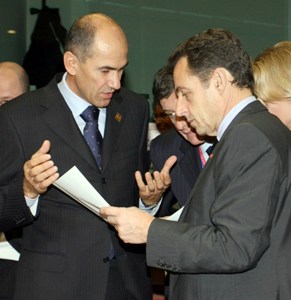
Prime Minister Janez Janša and French President Nicolas Sarkozy (Photo: Bor Slana/Bobo)
The proposal by Slovenia and the next presiding country, France, for the preparations for the implementation of the treaty to be discreet, was backed by other member states. The work will begin with less sensitive issues, where Slovenia and France will carefully coordinate among themselves. "My discussion with the French President on Monday will focus on this agreement. There is one year, two presidencies and one common task: to prepare what is necessary for the Treaty to be ratified smoothly, while we prepare for its implementation," said PM Janez Janša.
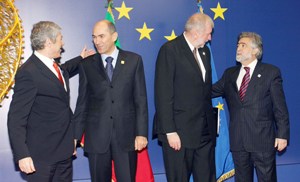
Prime Minister Janez Janša and Minister of Foreign Affairs Dimitrij Rupel and their Portuguese colleagues (Photo: Bor Slana/Bobo)
Only a day after signing the Treaty of Lisbon, the EU faced its biggest current foreign policy challenge: the future status of Kosovo. According to the PM, the decisions taken by the European Council in this respect provide the basis for the building of a common and unified European policy on the issue and the region in general in the coming months.

(Photo: Bor Slana/Bobo)
"The European Council has established, in unanimity and unison, that the current situation in Kosovo is unsustainable, that maintaining this situation will lead to a destabilisation of the region. The Council has also established that resolving the pending status of Kosovo constituted a sui generis case, which cannot be compared with any other situation in the world," said the PM, adding that the European leaders also agreed that all conditions had been met for the EU's direct engagement in Kosovo through missions. These will contribute to stabilising the situation in future and making Kosovo capable of reaching European standards, enabling it a European perspective. According to the PM, preparations for the mission have already begun; however, the speed depends on the ability of member states to ensure the needed capacity and particularly on the development of conditions in Kosovo. "This does not mean engaging military potential. That is the task of NATO and not the European Union. It means engaging people who will work in the civil administration and police forces," said the Slovenian PM, adding the European Commission would provide the funding. Slovenia, which is already heavily engaged in Kosovo, will cooperate in this mission according to its ability. "Proportionally, in terms of the size of country and population, Slovenia is among those European countries which contribute most to the stability of Kosovo," said the PM.
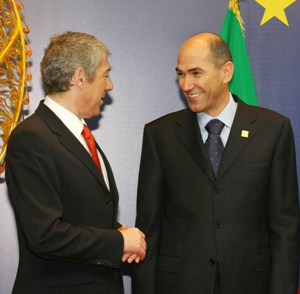
Prime Minister Janez Janša and Prime Minister of Portugal Jose Socrates(Photo: Bor Slana/Bobo)
"The European perspective was particularly stressed, as the conclusions referring to Kosovo are counterbalanced with the decision of the European Council regarding Serbia's European perspective," said PM Janša, adding that the European Council supports the latter, the progress it has made on and the fact that Serbia has sufficient administrative capacity to step up on this path. "The conclusions mention a permanent condition for Serbia's advancement on its way to the European Union - cooperation with the Hague tribunal. So it will to a great extent depend on Serbia in the next weeks and months how quickly the European Union can take the next decision and steps," said the PM.
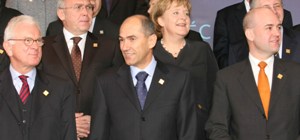
(Photo: Bor Slana/Bobo)
PM Janez Janša said that in the coming months further technical decisions would be taken on the basis of today's conclusions. "There will be one more attempt in terms of additional agreement and coordination; then the Troika will report to the Security Council. If there is any improvement, we can expect that further steps in resolving this issue will be faster, more unanimous. If not, engaging the EU is even more important," said the PM, adding that today's conclusions were the end of the period when answers to the question of Europe’s position on Kosovo were not always clear. "From today on, these answers are known, and on their basis the correct approaches and all steps entailed by the situation can be built in the future," said the PM.
Answering a journalist's question about the recognition of Kosovo by the international community, the PM explained that the European Council had not discussed concrete operational steps, but had taken a political decision enabling those concrete steps which have to be take in the future to be adapted to the situation. "The basis adopted today is wide and flexible enough to give European institutions the mandate to act as necessary," said the PM.
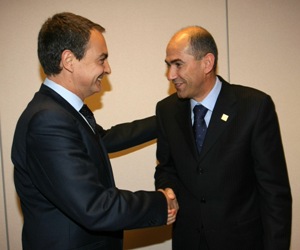
Prime Minister Janez Janša and his Spanish counterpart, José Luis Rodríguez Zapatero (Photo: Bor Slana/Bobo)
Against the backdrop of the European Council meeting, PM Janša met his Spanish counterpart, José Luis Rodríguez Zapatero, to present the priorities of Slovenia's Presidency. They also discussed issues of special significance to Spain, particularly migration and preparations for the EU-LAC Summit in Peru in May 2008.